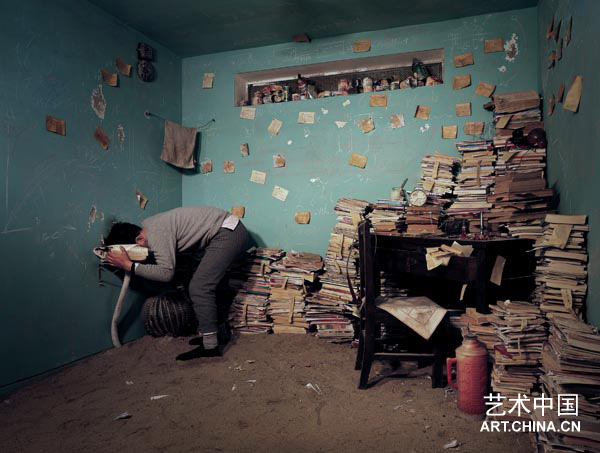
《偽》
展覽時(shí)間:2007.12.1 – 2007.12.30|11:00 - 18:00|周一休息
展覽地點(diǎn):站臺(tái)中國(guó)798項(xiàng)目空間
展覽地址:北京市朝陽(yáng)區(qū)酒仙橋路4號(hào)大山子798藝術(shù)區(qū)內(nèi)
在一個(gè)道德淪喪的時(shí)代,大意的人們忘記了、回避了、或說(shuō)視而不見(jiàn)了一個(gè)基本的事實(shí):今天的文明還剩下多少真實(shí)性值得推敲?很少有人還真正在意文化的本義究竟是什么,真?zhèn)谓诲e(cuò),魚(yú)龍混珠,難道這就是一切事物的真相?文明的虛偽性使得藝術(shù)家們總是不斷地抱著腦袋與自己較勁,然而他們沒(méi)有拿輕薄的自我說(shuō)事兒,而是試圖通過(guò)制假反假的方式揭露偽文化帶來(lái)的一切假象,以此發(fā)出自己的聲音,哪怕是微弱的。是不是可以懷疑,無(wú)論從自我還是群體來(lái)說(shuō),文明本身就是一個(gè)虛偽的代名詞?
陳維作品中的人物,或抑郁、或沉思、或不知所措,在被置換的場(chǎng)景中,他們找不到自身的坐標(biāo)和出口。封閉的空間里充斥著一種很微妙很緊張的心理暗示:當(dāng)時(shí)間概念被模糊時(shí),帶有過(guò)去痕跡的陳舊物品的反復(fù)羅列,對(duì)于人的心理是永遠(yuǎn)無(wú)法回避的刺痛。
馬永峰利用大膽的假設(shè)還原了人們最初關(guān)于自然的夢(mèng)想。這些美麗的人造景觀造成強(qiáng)有力的圖像侵略,雖非頹廢攝影,卻有意哀傷,控訴著人與動(dòng)物作為原始自然的他者最終缺席的自省,攝像機(jī)鏡頭下,充滿了戲劇化的諷刺。
金閃鏡頭下的人群、詞典、旗幟、繩索、宗教色彩,是造成一切光怪陸離幻覺(jué)的起源。他似乎要表達(dá)一種精神出軌的游離感,使得“游行”也變得虛偽和浮夸,仿佛是馬戲團(tuán)惡作劇的表演。
王寧德的作品有意在虛構(gòu)的時(shí)間、空間里將人物的身份與事件置換:成年人在想象中的世界天真無(wú)邪地玩著兒時(shí)的游戲。記憶越遙遠(yuǎn),生活越真實(shí),幻象也就越趨于假作。藝術(shù)家用圖像而不是破爛的文字告訴人們,當(dāng)我們將夢(mèng)想嫁接于不合適的載體,一切都變得那么蒼白而沒(méi)有延續(xù)性。
楊龍海的裝置則設(shè)置了一個(gè)騙局,用性感的嘴唇和言語(yǔ)引誘觀眾靠近,當(dāng)人們懷著好奇的心態(tài)去嘗試,卻發(fā)現(xiàn)自己成為被愚弄的對(duì)象。他用這種直觀的方式提醒人們,禁不住誘惑,其本質(zhì)就是被自我欺騙。

陳維
《催眠筆記》
攝影
125X185cm
2007
Exhibition Duration: 2007.12.01 - 12.30 | 11:00 - 18:00 | Closed on Monday
Place: Platform China Contemporary Art Institute 798 Project Space
Address: 798 Art Distr., Dashanzi, No.4 Jiuxianqiao Rd., Chaoyang Distr., Beijing
As nowadays moral is neglected, people don’t pay attention anymore to the fact, avoid or disregard it: Today how much authenticity is still in our civilization? Only few people care about what the culture’s original meaning is. The world is both true and false. The civilization’s inveracity makes the artists struggle with their ideas. However they don’t want to attract the audience’s attention on themselves, but they try their best to expose the gloss of a pseudo-culture, expressing their own perspective even if it won’t be persuasive. As an individual or a group, can we imagine that civilization is another pronoun for false?
In his work, Chen Wei set up a depressed, lost or meditating character that couldn’t find his own way in those similar scenes. The enclosed space is filled up with a delicate and tense psychological hint: when time is unknowable, the accumulation of obsolete items from memories gives somewhat to everyone an unavoidable quiver.
Through his work, Ma Yongfeng restores people’s primordial dream about nature. The beautiful man-made landscapes become a powerful accusation to the human and animal’s absence. His photography is not passive but saddening, likes a theatrical satire.
The crowd, dictionaries, flags, ropes and religious themes are the hallucination’s origin of Jin Shan’s works. He seems to describe a dissociation of spirit, which makes the parade looks like performing a circus’s chaffing sideshow.
In an imaginary time and space, Wang Ningde exchanges on purpose characters identity and event: in a dream world adults are innocently playing like in their childhood. While memories are quickly fading away, life is becoming more real and illusions more false. The artist uses images instead of words to show us that if dreams are grafted on unsuitable medium everything becomes fad and effectiveness.
In his installations, Yang Longhai uses sexy lips and tongue to flirt with the audience, but as people walk towards it with curiosity he refuses. He is making a joke to call people’s attention: failed resisting the temptation is actually a self-deception.

陳維
《沙子與沒(méi)有人1》
攝影
125X165cm
2007
|

